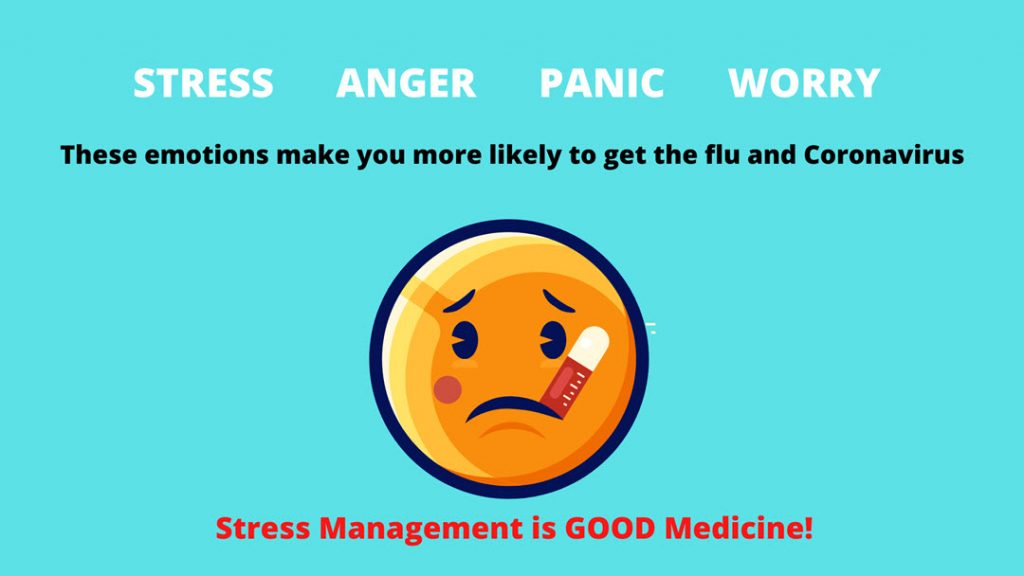The effect of stress on your immune system
It’s that time of year: flu season. It’s not just influenza knocking everyone down this time of year either. Common colds, pneumonia, strep throat, stomach flu, and so many other illnesses run rampant during the winter months.
All these illnesses come with a host of dreadful symptoms, missed work and other activities, and basically several days of plain misery. With all these germs going around, along with the new threat of a coronavirus outbreak looming over our heads, making sure our immune system is as strong as possible should be at the top of everyone’s priority list.
Of course, eating healthy foods and getting plenty of rest are great ways to keep your immune system doing what it’s supposed to do. However, one of the best ways to keep from getting sick might surprise some people.
 Stop stressing is the strongest and best medicine for viral infections
Stop stressing is the strongest and best medicine for viral infections
Just like influenza, the coronavirus is a highly contagious infection. It is spread by coughing, sneezing, and likely through feces. Suppose you’re in a public place like a grocery store. A few people around you are coughing and sneezing. How do you react?
- Does it bring up worry or anger that you might contract the virus?
- Are you worried or upset that you may spread the virus to your family and co-workers?
- Are you frustrated or afraid that you may need to stop working for ten to 14 days?
- Is your mind racing with all these negative thoughts trying desperately to predict the future?
Anxiety, panic, anger suppress your immune system
Your immune system is the most potent defense against viruses. When we’re stressed out, our bodies release a hormone called corticosteroid, which suppresses the immune system, and not just a little bit. Studies have shown that stress and anxiety, especially when lasting more than a day or two, can significantly weaken all aspects of a person’s immune system and make you far more likely to catch any illness that comes your way.
This tells us one important thing: if you don’t want to get sick, learn how to manage your stress.
What is influenza
Flu season gets its name from influenza, which is not the same as the stomach flu – a common misconception. Influenza is caused by influenza A and B viruses, and although it’s usually mild, it can be quite serious – in some cases even fatal.
Influenza is very contagious, and it spreads when an infected person coughs or sneezes. The germs can be spread airborne up to six feet, and they can also be passed from person to person via surfaces that we touch.
Symptoms of influenza
Symptoms of influenza include:
- Fever, cold chills, and/or night sweats
- Difficulty breathing
- Coughing and sore throat
- Headaches and body aches
- Fatigue
- Loss of appetite
If you think you have influenza:
- drink a lot of nutritive broths and pure water; eat lightly
- eat soups and other foods that are easily digested
- getting plenty of rest.
Children, elderly people, and anyone with a chronic medical condition or who has a compromised immune system should see a doctor. Dr Gruber is available to consult with patients who want a natural solution for treatment of influenza and coronavirus. Our online dispensary (see cold and flu season) has the most effective natural supplements for treating colds, influenza, and coronavirus. Please contact the office for a treatment plan for you and your family.
How to protect yourself from influenza, and other illnesses naturally
We are not completely helpless when it comes to the influenza virus. There are many ways to boost your immune system and avoiding the germs that cause the flu and other illnesses. Getting an annual flu shot is always an option, but if you’re looking for natural ways to avoid influenza, some of these may work:
- A healthy diet. Take your Vitamin C, but remember, it’s not just Vitamin C that boosts your immune system. Zinc, B vitamins, iron, and many other vitamins and minerals are important for your body’s defense against germs. Make sure you’re eating plenty of fruits and vegetables and consider taking a multivitamin when the weather starts to cool off.
- Get plenty of rest. Fighting off viruses is hard work.
- Don’t smoke.
- Limit alcohol.
- Wash your hands. A lot.
- Avoid physical contact when possible. You don’t always have to shake people’s hands. You can smile and wave when introducing yourself – maybe make a little joke about not wanting to spread germs. It’s not rude. Other people will probably appreciate it.
Learn how to manage your stress and anxiety. You can be doing all of things listed above, but if you’re really stressed out, it’s like leaving the back door open. All the infections will get right past your barriers. If you’re struggling with managing your stress, contact Family and Environmental Medicine for a comprehensive consultation.
Manage your stress and boost your immune system with Dr. Gary Gruber
Dr. Gary Gruber is a licensed naturopathic practitioner and holistic health counselor. He owns Family and Environmental Medicine where he specializes in helping his patients find natural solutions for colds and influenza caused by stress and anxiety.
If you struggle with managing your stress and anxiety, contact Dr. Gary Gruber.
Family and Environmental Medicine is in the heart of Fairfield County, Connecticut across from the Bristow Bird Sanctuary and Wildwood Preserve. His office is only 10 minutes from Wilton, Stamford and Darien, 20 minutes from Greenwich, and an hour from Grand Central Station by MetroNorth.


